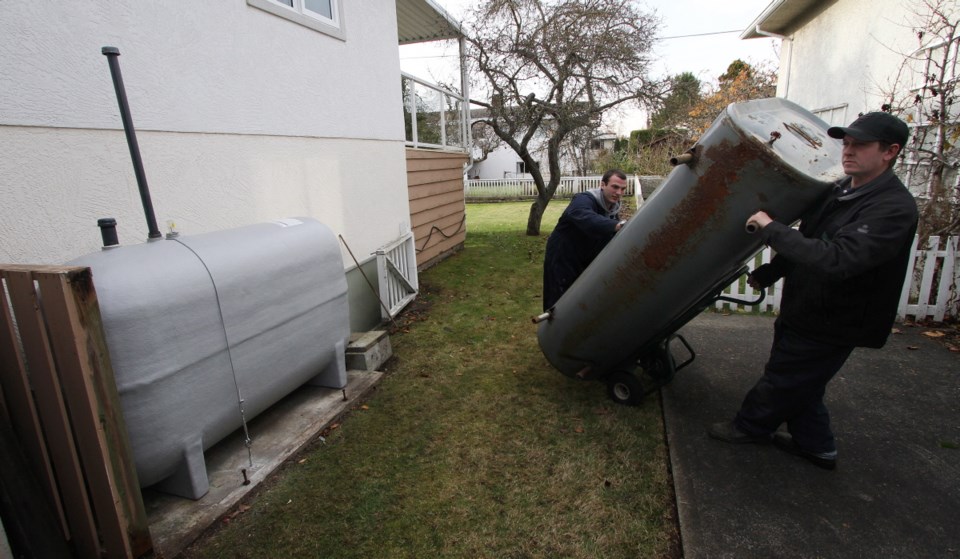Location may be the golden rule in real estate, but there’s likely a new one biting at its heels in the wake of a series of fuel spills involving home heating oil from storage tanks both above and below ground.
The new rule: If you plan to buy or sell a house, find out if there’s an oil tank buried on the property before it costs you.
“It’s all about due diligence, from both sides,” said Carol Crabb, president of the Victoria Real Estate Board. “Both buyers and sellers need to do their homework.”
Crabb, whose company, DFH Real Estate, had a presentation from a home inspector on that issue Wednesday morning, said real estate agents are constantly being reminded about the dangers of buried oil tanks and that they need to be reminding their clients.
“It starts with the seller. If they are thinking about selling their property, the agent should get the seller to have the property ‘swept’ [for buried tanks] or check the municipal records,” she said. “And if the seller hasn’t done it, the buyer’s agent should be doing it.
“If they get a clean bill of health, then it’s all good. If not, then you are back at the negotiation stage, and that could mean reducing the purchase price to offset removal costs, the seller agrees to remove the tank before the sale, or the buyer and seller share the costs.”
The danger of not knowing about those buried tanks played out recently with a series of leaks into local waterways. In the last year, there have been 28 spills of contaminants, and the clean-up can come with a hefty price tag for the homeowner.
Crabb said that while the disclosure form homesellers sign includes a line about oil tanks on the property, many are not aware there could still be a tank buried on the property.
“Just because there is an above-ground oil tank, or an above-ground tank was removed, doesn’t mean there isn’t one buried underground,” she said.
In fact, according to Corey Hughes, whose family has run Victoria Tank Services for 54 years, if the home was built before the 1960s, there’s a very good chance a tank is buried on the property.
“They didn’t come out with above-ground tanks until 1957, and they weren’t common until 1960-61,” said Hughes, who said he has removed or rendered inert tens of thousands of oil tanks in his 15 years on the job.
With the recent publicity over the oil spills into waterways, Hughes said the company is being run off its feet and is booked through Christmas.
“Everyone’s scared now. They’re worried,” he said. “And this is supposed to be our slow season until February.”
Victoria Tank Services offers a free sweeping service to determine whether there is a buried tank on the property.
If one is found, they dig down to determine whether it has been rendered inert. If it hasn’t, they do that work — pumping out any residual oil, flushing, cleaning and filling with sand.
Hughes said some municipalities require tanks to be removed; in others, tanks can be left in the ground after being rendered inert.
If the tank has leaked, which Hughes said is not common, the ground must be cleaned up.
“Typically, in 95 per cent of the cases, it’s pretty good, though there will always be a little around the tank,” he said. “As long as it isn’t much, often we just backfill.”
Where there is more contamination, the soil is remediated while the hole is open.
Hughes also noted the cost of doing this work isn’t prohibitive. Rendering a tank inert is about $550, while remediation in normal cases can run from $2,000 to $5,000.
“It’s not the tens of thousands people think it is,” he said. “And aside from the money, it’s a quick and painless process.”
Crabb said doing that kind of work can save a lot of headaches and money later if the leaking leads to bigger problems and a large-scale clean-up.
“It doesn’t cost anything to do a sweep or to check with the municipality, and it has to be dealt with at some point,” she said.
